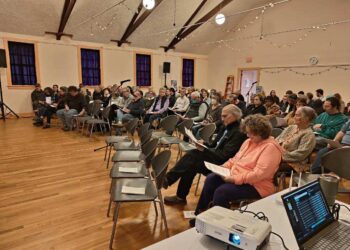When James Jette was a senior at Martha’s Vineyard Regional High School in the 1980s, the guidance counselor wouldn’t write him a college recommendation.
“Told me I should go to the military, that was my trajectory,” said Mr. Jette, now the superintendent of public schools in Milton, during his keynote speech at Monday’s Martin Luther King, Jr., Day virtual luncheon and membership drive for the NAACP of Martha’s Vineyard.
“It’s not a knock — it’s the reality,” added Mr. Jette, who moved to the Island as an adolescent to live with relatives after experiencing homelessness in Boston.
“This is a story that I was often embarrassed to talk about,” he told more than 100 listeners who signed in for the online gathering. “I share it because it doesn’t matter where you start, it’s where you land, and where I landed I feel very proud of.”
Mr. Jette, who played on the high school’s 1986 Cape & Island League champion basketball team, didn’t accept his guidance counselor’s low expectations of him. He went to college and then graduate school on his way to a career in public school administration.
“When somebody tells me I can’t do something, I’m going to try to prove them wrong,” he said.
Educators should never write off their students, Mr. Jette told his listeners.
Over 100 people attended the virtual talk which was also a membership drive for the NAACP of Martha’s Vineyard.
“Once you give up on them, they know,” he said, advocating for a perspective in which students are viewed not for their shortcomings, but for what they are capable of achieving.
“We need strength-based thinking,” he said. “We need to make sure our young folks, particularly black and brown, believe in themselves.”
After working for 12 years as a high school and middle school principal in Milton, Mr. Jette became the district’s top administrator a year and a half ago and has been using his pulpit to advocate for change, he said.
“I’ve been talking about diversity, equity and inclusion in all aspects, not only in education but in the workforce, in politics and so forth,” he said.
Mr. Jette has met some community resistance to his initiatives, he told the group.
“There are some people who try to steal that narrative and talk about critical race theory,” he said. “It’s not critical race theory — it’s culturally responsive teaching, implemented into an individual teacher’s craft. And what that means is acknowledging the students, their cultural identity, their identity as a whole. Their language. Their interests … It’s not a set curriculum. It’s just understanding and knowing who is before you.”
Equity, in particular, is a frequently misunderstood concept that should not be confused with equality, Mr. Jette said.
“Equality means I give everybody in this room a pair of sneakers,” he said. “Equity means I am giving everybody a pair of sneakers that fit them.”
Equity in education means providing access that allows students with different abilities to participate in the same activities, Mr. Jette said, using as comparisons the frequently-seen ramps for wheelchairs and the widely diverse finishing times among marathon runners.
“You don’t change the expectations,” he said. “You have high expectations for everybody.”
Mr. Jette also discussed the importance of voting in local, regional and national elections, and of encouraging students to think about civic issues and politics before they hit voting age at 18. In his own youth, he was completely disengaged from politics, he said.
“I was ignorant, I was passive and it was very difficult to engage me in a political discourse,” he recalled.
“I didn’t think I had an impact on it as a person of color, African American Native American man,” continued Mr. Jette, whose family is enrolled with the Chappaquiddick tribe of Wampanoags.
Now, he sees voting under threat from repressive laws being passed in multiple states.
“We can’t take …the voting right for granted,” Mr. Jette said. “Your vote does count, [and] those who are responsible for educating the children need to plant that seed in their head.”
Following his formal remarks, Mr. Jette answered a stream of audience questions read by event chair Grace Robinson, who is also his sister. Asked about the effect on public school teachers of the high cost of living on Martha’s Vineyard, Mr. Jette advised collective action.
“That is a conversation worth having with town officials [and] with your school committees,” said Mr. Jette, suggesting a potential raise or housing stipend for Island teachers. “It is a huge challenge, especially if you have to rent.”
“This is a time for educators to stand together,” Mr. Jette added. “In isolation, you’re fragile. In concert, you’re a giant.”
Before Mr. Jette spoke, Monday’s virtual luncheon guests heard from a current student at the regional high school, Beth Jennings, who read Martin Luther King, Jr.’s 1957 speech Give Us the Ballot. The 15th Amendment was passed in 1870, stating that voting rights could not be denied by race or color, and yet African Americans were subject to numerous voting barriers at the state level until the Voting Rights Act of 1965 was passed, Mr. Jette noted during his talk.
“That’s not that long ago, folks,” he said.








